Iranian Teachers' Association Condemns Death Of Armita Geravand
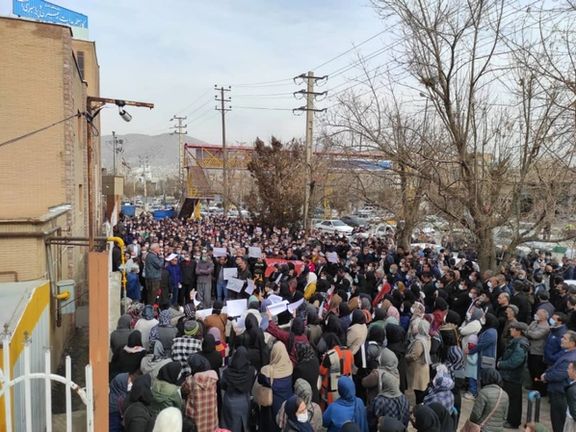
The Iranian Teachers' Association has released a statement condemning the death of Armita Geravand, who lost her life after a confrontation with hijab enforcers.

The Iranian Teachers' Association has released a statement condemning the death of Armita Geravand, who lost her life after a confrontation with hijab enforcers.
The association's statement acknowledges Armita, along with Mahsa Amini and other young girls, as “courageous fighters who took a stand against the authoritarian regime's ideological policies. Their unwavering resilience came at the ultimate cost of their lives.”
On October 1, Armita, 16, fell into a coma after an encounter with hijab enforcers in the Tehran subway. While the government has attempted to obscure the details of the incident, it appears that she was pushed by a female agent, resulting in a severe head injury.
Security measures were taken to prevent the dissemination of information or photographs or CCTV footage from the scene at Tehran's Fajr Hospital. She was subsequently declared brain dead and died in hospital on Saturday.
On Monday, the association, which stands bravely against the Islamic regime in the face of continued oppression of dissenting voices, including targeting academia, said: “Armita's case is one of several in which young girls have paid a heavy price for their defiance in advocating for optional hijab."
It stated that the option to wear hijab, mandated by the regime since its formation in 1979, "plays a pivotal role in advancing the democratic process of the Iranian people".
The group said: "Gender equality is an essential component of democracy, and the pursuit of optional hijab represents a realistic and achievable aspiration, vital for the realization of this democratic process."
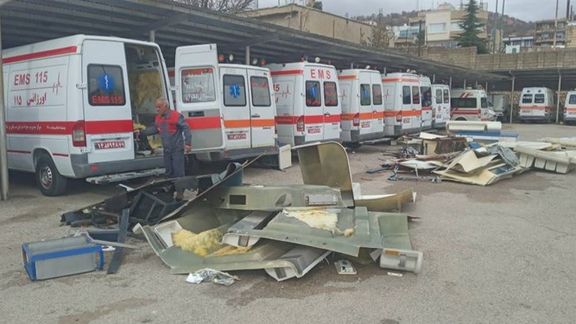
A top official in Iran’s Emergency Services has told local media that 3,000 ambulances used by his department are “worn-out,” amid a general financial crisis.
Jafar Miadfar in a press conference on Sunday said that government has promised to acquire 500 new ambulances by March 2024, and “some promises” have been made for 500 more.
The Iranian government has been facing budgetary problems for more than a decade, when first the United Nations and later the United States imposed economic sanctions, mainly to rein in Iran’s nuclear program. US sanctions imposed since 2018 have substantially reduced government oil export revenues that constitute more than half its annual budget.
Miadfar complained about the current budget, which has only increased the wages of emergency workers but has neglected other needs, such as equipment, vehicles, fuel and supplies.
He explained that 26,000 people work for the Emergency Services and they render assistance to an average of 2.5 million people annually.
Similar difficulties exist in other areas, such city transportation, hospitals and school facilities. Most of Tehran’s 7,000 city buses are also considered unfit for service since 2017, and the government has been unable to replace them, even with used vehicles from more affluent countries.
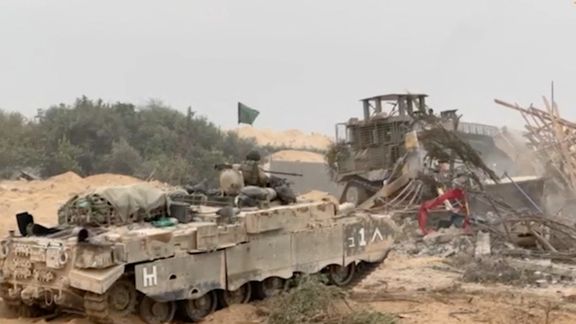
Israeli forces carried out airstrikes on targets in Syria and Lebanon Sunday evening, affiliated with the Lebanese Hezbollah and Iran's IRGC forces.
The Israel Defense Forces (IDF) confirmed the operations through posts on X, claiming that they had struck Hezbollah facilities in Lebanon.
The attacks came only hours after Hezbollah announced that its Secretary General Hassan Nasrallah would deliver a speech this Friday.
They first teased the news with a 10-second video, in which a figure resembling Nasrallah is seen walking past a Hezbollah logo on a wall. The mysterious clip went viral as viewers tried to decipher it.
Speculation is rife that Nasrallah's upcoming speech may involve some kind of declaration of war against Israel.
Hezbollah, backed by the regime in Iran, boasts an extensive stockpile of rockets, which makes it a far more formidable military force compared to Hamas.
On Sunday, before Israel confirmed striking Syria and Lebanon, reports had emerged that Hezbollah rockets had breached Israel’s missile defense system (Iron Dome), hitting a residential building in northern Israel.
The Biden administration has been trying hard to prevent a broader conflict, which would force it to enter yet another war in the Middle East exactly one year before the 2024 elections.
Critics of Biden’s foreign policy maintain that his reluctance to act tough (against Iran, in particular) would make the situation even more difficult for the US.
“What we need to do is send a clear and forceful message,” said Senator Tom Cotton on Sunday, “whether it’s striking IRGC officials in Syria or in Iraq, or striking directly at Iranian facilities inside Iran to make it clear that we won’t tolerate attacks on Americans throughout the region by Iranian proxies.”
Last week, the Pentagon revealed that American troops in Syria and Iraq had come under repeated attacks from Iran proxies in the week between 17 and 24 October.
Senator Cotton told Fox News that the Biden administration should learn from Donald Trump in assassinating Qassem Soleimani in January 2020.
“If we don’t do something like that,” he warned, “these attacks are going to continue until Americans are killed.”
Iranian officials have become increasingly boastful since Hamas attacked Israel on October 7, killing at least 1,400 and taking more than 200 hostage.
On Sunday, Iran's President, Ebrahim Raisi, took a typically brazen line, suggesting that Hamas forces were repelling the Israelis in Gaza –and that would be “a defeat heavier than the initial one for Israel.”
Reports from northern Gaza described fierce air and artillery strikes Sunday evening, affecting areas near Gaza City's Shifa and Al-Quds hospitals.
The Palestinian Red Crescent reported receiving warnings from Israeli authorities, urging the immediate evacuation of Al-Quds hospital, which currently shelters approximately 14,000 people.
International organizations say Gaza is facing an acute humanitarian crisis. The head of the UN agency for Palestinian refugees (UNRWA) has warned that "many more will die" in Gaza if the Israeli bombing and siege continues.
Calls for a humanitarian ceasefire have intensified in the past week. But Israel has rejected all such calls and announced that its ground operation would continue unabated.
Hamas officials say Israeli airstrikes on Gaza have so far killed more than 8,000 Palestinians, at least half of them women and children. These numbers cannot be independently verified.
The situation is dire as basic necessities like water and food have been cut off from the densely populated enclave of 2.2 million. Israel has allowed limited aid to enter in the past few days.
On Sunday, another 33 trucks were let in, containing water, food and medicine. But the humanitarian workers on the ground say the aid received so far falls desperately short of needs.
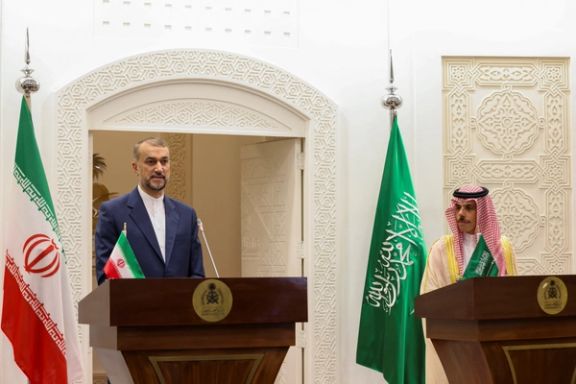
The Foreign Ministers of Iran and Saudi Arabia spoke about the ongoing situation in Gaza on Sunday as Israel and Hamas continued into week three of war.
Hossein Amir-Abdollahian, the Iranian Minister of Foreign Affairs, and his Saudi counterpart, Faisal bin Farhan, spoke by telephone according to the Iranian Students' News Agency (ISNA).
The conversation addressed what Amir-Abdollahian termed the "dangerous developments in the Gaza Strip" in familiar language reiterated by Iranian regime figures since Hamas declared war on October 7. The two apparently underscored "the pivotal role of the international community in achieving a ceasefire and safeguarding the civilian population, especially in light of the escalation of military operations", as Israel began targeted ground operations this weekend.
The engagement between Iran and Saudi Arabia follows their in-person meeting at the end of October during a session of the Executive Committee of the Organization of Islamic Cooperation held in Jeddah.
Last week, US President Joe Biden said a primary goal of Iran-backed Hamas' attack of October 7, the single most deadly day for Jews since the Holocaust, was to throw out normalization between Israel and Saudi, following deals with other Persian Gulf states under the Trump administration.
"One of the reasons Hamas moved on Israel ... they knew that I was about to sit down with the Saudis," Biden said. "Guess what? The Saudis wanted to recognize Israel."
Just days ago, the Deputy Commander of Iran's Revolutionary Guard, Ali Fadavi, claimed that Hamas had successfully disrupted efforts to normalize relations between Saudi Arabia and Israel with its attack, which it deemed a US conspiracy.
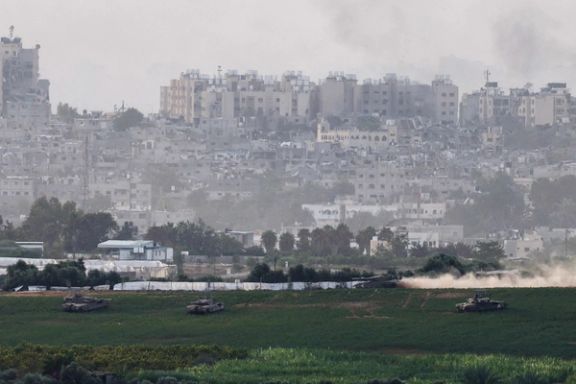
Both the US and Iran say they do not want the Hamas-Israel war to spiral out of control, but Iran roots for the militants and the US is beefing up its military presence in the region.
Iranian Foreign Minister Hossein Amir-Abdollahian said during an appearance on CNN Sunday that Iran does not want the Mideast war to "spread out."
"We always had political, media, and international support for Palestine. We have never denied this," he said, adding, "This is the truth, but in relation to this operation called the Al Aqsa Storm, there was no connection between Iran and this Hamas operation, not my government nor part of my country."
Earlier in the day, Iranian President Ebrahim Raisi renewed threats to Israel and the US after Israel launched the ground offensive in Gaza. "The Zionist regime's crimes have crossed the red lines, which may force everyone to take action," he said, suggesting once again the threat of action from its proxies in the region.
White House national security spokesperson John Kirby said Sunday that he would not comment on the expanded ground operation, but he said Washington supported Israel's right to defend itself. "We're not drawing red lines for Israel," he added.
Authorities in the Iranian regime issue fiery statements, threatening escalation in the Gaza war, but they have not taken any concrete steps on the ground to underpin their claims. Media outlets affiliated with the regime and its Revolutionary Guards cite local media about attacks on US bases, but no Western source confirms such reports.
Two US fighter jets struck Iran-linked military facilities in Syria early Friday, a few hours after 900 more US troops arrived in Syria to bolster air defenses for American personnel amid a surge in attacks by Iran-backed militias. Earlier, White House spokesman John Kirby confirmed that Washington has “relayed direct message” to Iran after Biden reiterated its “warning to the Ayatollah,” referring to Iran’s ruler Ali Khamenei.
The Kremlin said Friday that the US strikes show broader regional tensions but claimed there is no danger of Russia being dragged into the conflict. The statement came as Moscow's decision to invite a Hamas delegation has outraged Israel, which urged Russia to expel the group, calling the invitation "deplorable".
The United States has moved 'naval cities' to the region, a move that can be construed as a more consequential move than the symbolic trip by President Joe Biden to Israel to see with his own eyes the aftermath of Hamas attack that killed 1,400 Israelis. What can the US president do for over 220 hundreds of hostages, including Americans, from Tel Aviv that he cannot do from the White House?
As the war between Israel and Hamas reverberates across the Middle East, the risk of war between Hezbollah and Israel remains higher than at any point since their last big conflict in 2006. Reuters cited unnamed sources as saying that Hezbollah knows that Lebanon, with a struggling economy and a crumbling state, cannot afford another war between Hezbollah and Israel. "Hezbollah has no interest in war. Lebanon has no interest in war", a source familiar with Hezbollah thinking said.
Israel has time and again explained to the international community how most regional vices are done by tentacles of the Islamic Republic regime. After all, even if it is possible for Israel to eliminate Hamas militants, they will resurrect thanks to Ayatollah’s deep pockets being endlessly fed with oil money.
Immediately after the multi-thronged operation that Hamas calls al-Aqsa Flood, proclaiming its goal of flooding Israelis out of al-Aqsa, Iran and several other countries and world bodies started urging not to escalate the conflict. Israel has started testing the waters of a ground invasion but wants the world to side with it in the war that according to Palestinian authorities has killed over 7,000 Palestinians.
Israel, which had depended heavily on its military tech and intelligence to control sporadic attacks by the Islamist attacks and was caught by surprise -- has called up hundreds of thousands of reservists, its largest-ever. To acclimate the new army, whose forces have mostly been far from the military atmosphere, the US may be stalling before the conflict enters the next phase, an idea popping up in conversations about the Mideast crisis.
The reason that Iran does not take US warnings seriously and calls them “requests” is the lack of – or very limited – response to attacks on US troops by Iran-backed forces. Iranian President Ebrahim Raisi’s deputy chief of staff for political affairs Mohammad Jamshidi “does not take President Biden’s warnings seriously,” said Jason Brodsky, the policy director at United Against Nuclear Iran. “That should tell the White House something especially after over 13 attacks on US forces in October,” he added.
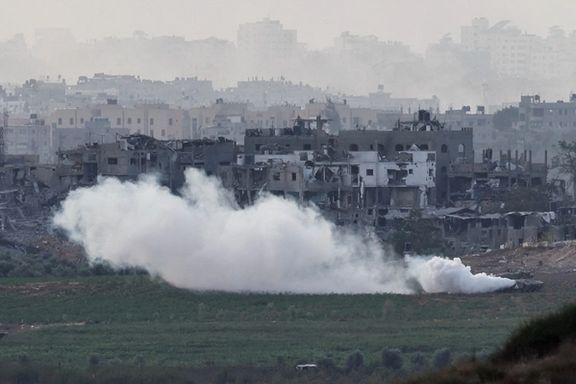
No major blow has been delivered against Tehran and its proxies, except for the targeted killing of IRGC’s Quds force commander Qasem Soleimani, the architect of Iran’s vast network of militias in the region. US Senator Rick Scott (R-FL) used Soleimani as an example of how the US should deal with the menace of Iran. “If Iran attacks the United States, everything the Ayatollah loves will be a target, and as you know, our aim is very good. Ask Soleimani,” he said on X (formerly twitter).
The war of words and visits to the region along with international meetings can be a prelude to the next phases of the conflict that may set the ground for World War III, that probably ensues after China joins Russia and Iran against the West.
The US has deployed large military power to near Israel but claims it will not engage in the conflict and pursues diplomacy to resolve the crisis. Biden also emphasized that its warning was about attacks on US forces and had “nothing to do with Israel at all.” However, 'Ayatollah,' who believes “diplomacy and battleground” are two complementary things which do not negate each other, claims Israel will not exist to see 2045 and moves toward his dream with material and psychological support.
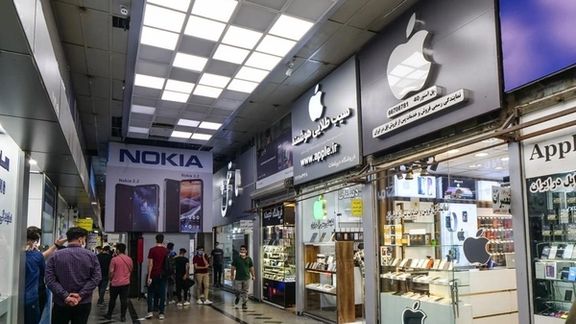
The Tasnim News Agency, associated with the Revolutionary Guards, has accused a new sponsor of the Esteghlal football club of engaging in the smuggling of iPhones.
In the past year, the Islamic Republic has not registered iPhone 14 and 15 models, and in recent weeks, following the introduction of the iPhone 15 to the market, it declared the buying and selling of the devices as “illegal”, citing them as contraband.
Citing the Amol Mobile Shop, the Tasnim report stated, "An examination of some viral videos in the virtual space shows that the new sponsor has been involved in offering prohibited iPhone 15 series in recent weeks."
Meanwhile, the secretary of the Coordination and Supervision of the Fight Against Smuggling of Goods and Foreign Currency in Khorasan Razavi stated that the confiscation of iPhones, specifically the 14 and 15 models, has commenced.
He announced that all relevant entities have received instructions to take action against those responsible for selling iPhones, and devices that assist in antenna reception are considered contraband and their sale is prohibited.
In August 2022, Supreme Leader Ali Khamenei issued a call to prohibit the import of "luxury American phones" into Iran.
"Nat'l production is key to employment, welfare, reducing inflation & increasing nat'l currency's power," Khamenei tweeted on his Russian language account, from an iPhone. "An obstacle to production is unneeded imports like luxury products. Last year, half a billion dollars were spent to import a certain luxury US mobile brand. Govt must stop this."
Suggesting the ban was a bid to cut national expenses, state news website Press TV claimed in February that the ban on Apple's iPhone 14 models alone would cut the country's six month import bill by at least $1bn.